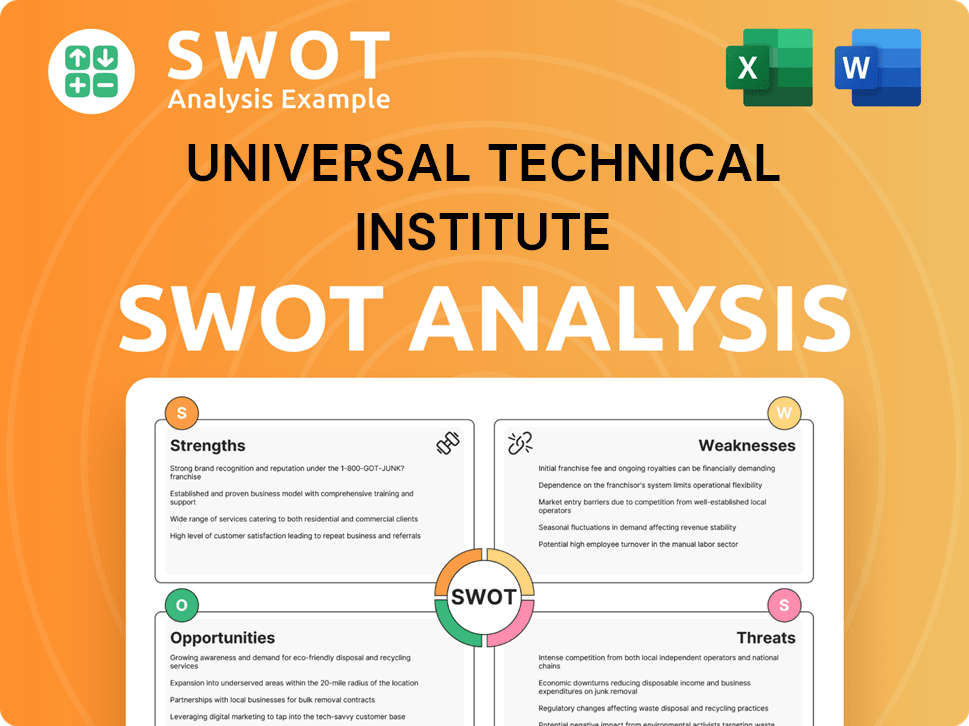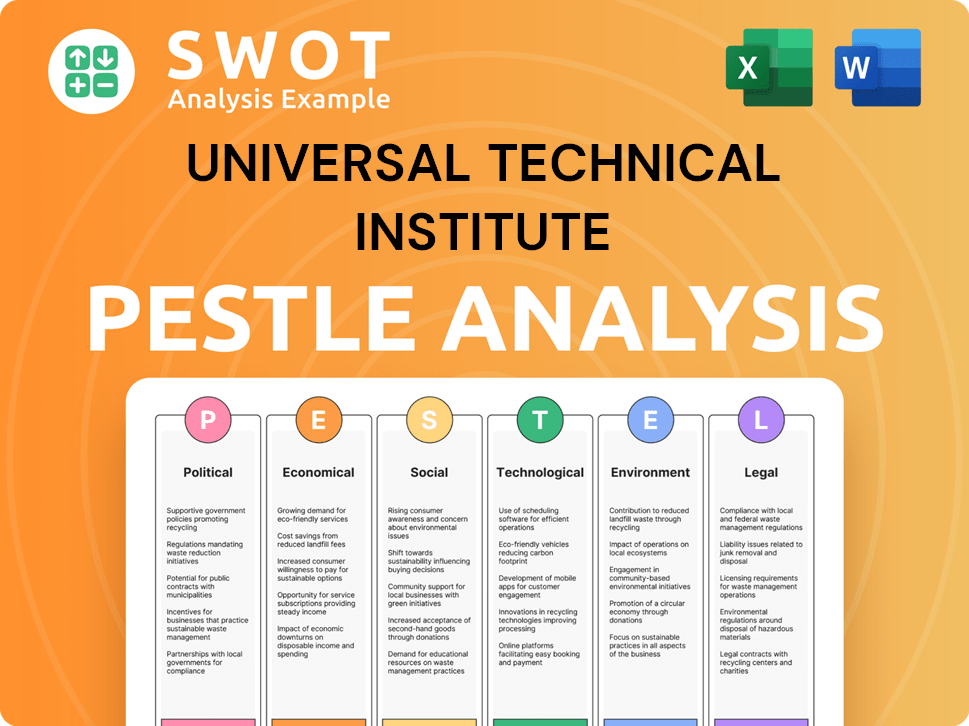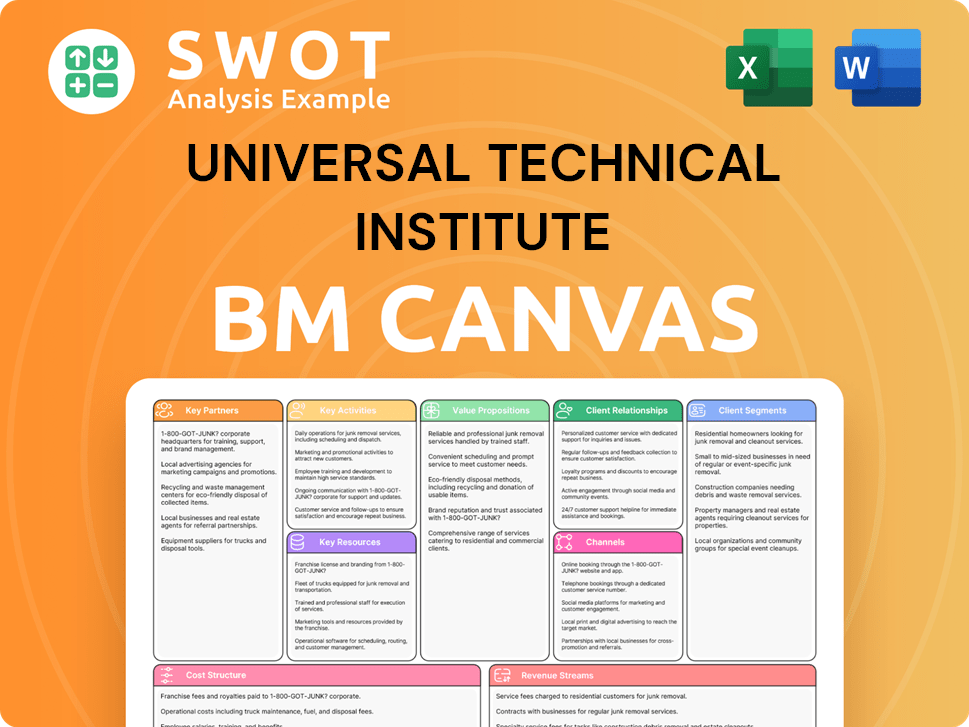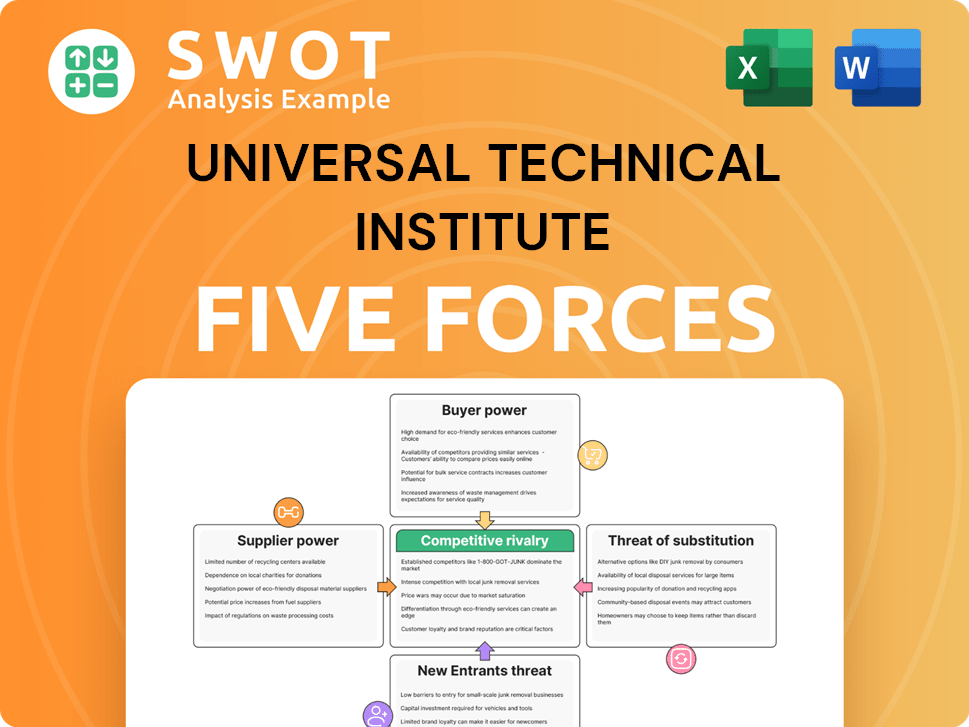Universal Technical Institute Bundle
How Does Universal Technical Institute Thrive in the Skilled Trades Sector?
Universal Technical Institute (UTI) is making waves as a leading workforce solutions provider, filling the crucial skilled labor gap in America. Specializing in technical education, UTI prepares students for careers as professional automotive, diesel, and other specialized technicians. With a focus on industry-aligned curricula and strong career placement, UTI is a key player in the trade school landscape.

UTI's impressive financial performance, with a 21% revenue increase in fiscal year 2024, highlights the surging demand for skilled trades professionals. For the six months ended March 31, 2025, revenue further increased. To gain a deeper understanding of UTI's strategic initiatives and market position, consider exploring a detailed Universal Technical Institute SWOT Analysis to assess its strengths, weaknesses, opportunities, and threats within the competitive technical education market. This analysis will help you understand the company's operations, including UTI programs and its commitment to shaping the future of technical education.
What Are the Key Operations Driving Universal Technical Institute’s Success?
Universal Technical Institute (UTI) creates value by providing specialized technical education, addressing the demand for skilled technicians across various industries. Their core offerings include diploma and degree programs for aspiring automotive, diesel, collision repair, motorcycle, and marine technicians. The acquisition of Concorde Career Colleges has broadened its offerings to include dental, nursing, and allied health professions.
The operational processes at UTI are designed to provide hands-on training and industry-aligned curricula. This involves developing and updating programs in collaboration with manufacturer partners like BMW, Ford, General Motors, and others. This ensures graduates are equipped with relevant skills and technological advancements, such as electric vehicle (EV) and hybrid training now integrated into core automotive programs. UTI's supply chain primarily involves educational resources, equipment, and technology necessary for practical training.
UTI leverages its extensive network of industry partnerships to facilitate student placements and career transitions, with some partners even offering tuition reimbursement. This focus on industry collaboration ensures that its programs directly meet the needs of employers, leading to high demand for UTI graduates and a clear path to employment. With a focus on practical skills, UTI distinguishes itself from competitors.
UTI offers a variety of programs focused on technical skills. These programs include automotive, diesel, collision repair, motorcycle, and marine technician training. The curriculum is designed to meet the demands of the industry.
The core of UTI's operations is hands-on training, using the latest equipment and technology. Programs are developed in collaboration with industry partners such as Ford and General Motors. This ensures that students learn skills directly applicable to their future careers, including training in electric vehicles.
UTI has strong partnerships with many companies, which helps with job placement. These partnerships provide students with opportunities for internships and employment after graduation. Some partners even offer tuition reimbursement programs.
UTI's value lies in its ability to bridge the gap between education and employment. By offering specialized, hands-on training, UTI provides a direct path to in-demand careers for its graduates. The focus on industry needs and practical skills sets UTI apart from other trade schools.
UTI's emphasis on industry collaboration and hands-on training distinguishes it in the trade school market. This approach ensures that graduates are well-prepared for the workforce. The focus on in-demand skills and strong industry connections provides a clear advantage.
- Specialized training programs.
- Strong industry partnerships.
- Hands-on learning experiences.
- Career-focused curriculum.
Universal Technical Institute SWOT Analysis
- Complete SWOT Breakdown
- Fully Customizable
- Editable in Excel & Word
- Professional Formatting
- Investor-Ready Format

How Does Universal Technical Institute Make Money?
The primary revenue stream for Universal Technical Institute (UTI) comes from student tuition and fees associated with its educational programs. The company operates through two main segments: Universal Technical Institute (UTI) and Concorde Career Colleges (Concorde). This structure allows for focused management and strategic planning within each area.
For the fiscal year 2024, the company's total revenue reached $732.7 million. This performance exceeded the updated full-year guidance. In the first quarter of fiscal year 2025, the company reported a 15.3% increase in revenue, reaching $201.4 million. Additionally, for the six months ended March 31, 2025, revenues increased by 13.9% to $408.9 million.
The UTI segment contributed $486.4 million in revenue in fiscal year 2024, reflecting a 13.3% increase compared to the previous year. This growth was driven by an increase in the average number of full-time active students. The Concorde segment added $246.3 million in revenue for fiscal year 2024, which is a significant 38.3% increase. In the first quarter of fiscal year 2025, the UTI segment saw revenues increase by 14.0% to $131.5 million, while the Concorde segment's revenues rose by 17.9% to $70.0 million. These increases are primarily due to a rise in the average full-time active students and new student enrollments across both divisions.
UTI's monetization strategies are centered on its tuition-based model, with ongoing investments in program expansion and new campus initiatives to drive future revenue. The company's focus includes launching new programs, such as HVAC and refrigeration, and expanding existing ones to attract more students. Furthermore, partnerships with manufacturers provide opportunities for customized training programs or certification courses, diversifying revenue streams.
- The company's financial performance indicates a strong and growing demand for its UTI programs.
- The expansion of programs and campuses is a key strategy for increasing enrollment and revenue.
- Partnerships with industry leaders are crucial for providing relevant training and job placement opportunities for students.
- The company's focus on technical education aligns with the growing demand for skilled trades professionals.
Universal Technical Institute PESTLE Analysis
- Covers All 6 PESTLE Categories
- No Research Needed – Save Hours of Work
- Built by Experts, Trusted by Consultants
- Instant Download, Ready to Use
- 100% Editable, Fully Customizable

Which Strategic Decisions Have Shaped Universal Technical Institute’s Business Model?
Universal Technical Institute (UTI) has achieved significant milestones that have shaped its operations and financial performance. A key strategic move was the launch of its multi-year 'North Star strategy,' with Phase I successfully concluding and Phase II commencing in fiscal year 2025. This strategy focuses on growth, diversification, and optimization, aiming for approximately 10% revenue CAGR and an Adjusted EBITDA margin approaching 20% by fiscal year 2029. For those seeking to understand the strategic direction, this is a crucial aspect of the company's trajectory.
As part of this strategy, UTI plans to launch a minimum of six new programs annually at existing campuses starting in fiscal year 2025 and open at least two new campuses each year between fiscal years 2026 and 2029. This expansion is designed to increase accessibility and cater to the growing demand for skilled trades professionals. In fiscal year 2025, nine new full-length programs and ten short courses are planned, along with three new campuses slated for 2026. These initiatives reflect UTI's commitment to adapting to market demands and enhancing its educational offerings.
The company has expanded its program offerings to include skilled trades like welding, CNC machining, HVAC repair, robotics, and automation, as well as energy technology and wind power programs. Notably, UTI has integrated EV and hybrid training into its core automotive programs across several campuses. Strategic partnerships, such as those with United Service Organization, Hawaiian Airlines, and iRacing, also provide additional career transition and placement opportunities for students. For more details on their mission, consider reading the Growth Strategy of Universal Technical Institute.
Successful completion of Phase I of the 'North Star strategy'. Commencement of Phase II in fiscal year 2025. Expansion of program offerings to include skilled trades and emerging technologies.
Launch of new programs and campuses. Integration of EV and hybrid training. Formation of strategic partnerships for career opportunities.
Strong brand recognition and industry-aligned curriculum. Extensive network of employer partnerships leading to job placements. Adaptability to new trends like EV technology and skilled trades demand.
Navigating the evolving regulatory landscape in postsecondary education. Maintaining compliance with federal financial assistance programs.
UTI's focus on growth, diversification, and optimization is evident in its strategic initiatives. The company aims for approximately a 10% revenue CAGR and an Adjusted EBITDA margin nearing 20% by fiscal year 2029. This involves expanding programs and campuses to meet industry demands.
- Launch a minimum of six new programs annually starting in fiscal year 2025.
- Open at least two new campuses each year between fiscal years 2026 and 2029.
- Integrate EV and hybrid training into core automotive programs.
- Form strategic partnerships for career transition and placement.
Universal Technical Institute Business Model Canvas
- Complete 9-Block Business Model Canvas
- Effortlessly Communicate Your Business Strategy
- Investor-Ready BMC Format
- 100% Editable and Customizable
- Clear and Structured Layout

How Is Universal Technical Institute Positioning Itself for Continued Success?
Universal Technical Institute (UTI) holds a strong position in the technical education sector. It is known for its comprehensive training programs and strong industry partnerships. The company benefits from a consistent demand for skilled technicians in areas like automotive, diesel, and healthcare. In fiscal year 2024, total new student starts increased significantly.
However, UTI faces several risks. The postsecondary education landscape is subject to change, particularly due to shifts in U.S. federal political leadership, which could affect accreditation, operations, and financial aid programs. Reliance on student loans and economic uncertainty also pose challenges. Despite these challenges, UTI is actively pursuing growth and expansion.
UTI is a leading trade school, offering specialized training programs. The company has established strong industry partnerships that support its educational offerings. The demand for UTI programs remains robust, driven by the need for skilled technicians.
Changes in government policies related to student loans can impact the company. Economic downturns may affect consumer spending on related services, thus influencing demand for trained technicians. The company is also subject to regulatory changes in postsecondary education.
UTI is focused on its 'North Star Strategy' Phase II to accelerate growth. The company has set ambitious goals for fiscal year 2025. Strategic investments are planned for new campus launches and program expansions.
UTI projects revenue between $825 million and $835 million for fiscal year 2025, representing approximately 13% year-over-year growth. Adjusted EBITDA is anticipated to be between $124 million and $128 million. The company aims for revenue exceeding $1 billion by the end of 2029.
UTI's 'North Star Strategy' Phase II focuses on accelerating growth through diversification and optimization. The company plans to launch at least six new programs annually at existing campuses starting in fiscal year 2025. The company plans to open at least two new campuses each year between fiscal years 2026 and 2029. For more details on the company's approach, see the Marketing Strategy of Universal Technical Institute.
- Increase new student starts to between 29,000 and 30,000 in fiscal year 2025.
- Expand its program offerings.
- Invest in new campus launches.
- Achieve adjusted EBITDA margins approaching 20% by the end of 2029.
Universal Technical Institute Porter's Five Forces Analysis
- Covers All 5 Competitive Forces in Detail
- Structured for Consultants, Students, and Founders
- 100% Editable in Microsoft Word & Excel
- Instant Digital Download – Use Immediately
- Compatible with Mac & PC – Fully Unlocked

Related Blogs
- What are Mission Vision & Core Values of Universal Technical Institute Company?
- What is Competitive Landscape of Universal Technical Institute Company?
- What is Growth Strategy and Future Prospects of Universal Technical Institute Company?
- What is Sales and Marketing Strategy of Universal Technical Institute Company?
- What is Brief History of Universal Technical Institute Company?
- Who Owns Universal Technical Institute Company?
- What is Customer Demographics and Target Market of Universal Technical Institute Company?
Disclaimer
All information, articles, and product details provided on this website are for general informational and educational purposes only. We do not claim any ownership over, nor do we intend to infringe upon, any trademarks, copyrights, logos, brand names, or other intellectual property mentioned or depicted on this site. Such intellectual property remains the property of its respective owners, and any references here are made solely for identification or informational purposes, without implying any affiliation, endorsement, or partnership.
We make no representations or warranties, express or implied, regarding the accuracy, completeness, or suitability of any content or products presented. Nothing on this website should be construed as legal, tax, investment, financial, medical, or other professional advice. In addition, no part of this site—including articles or product references—constitutes a solicitation, recommendation, endorsement, advertisement, or offer to buy or sell any securities, franchises, or other financial instruments, particularly in jurisdictions where such activity would be unlawful.
All content is of a general nature and may not address the specific circumstances of any individual or entity. It is not a substitute for professional advice or services. Any actions you take based on the information provided here are strictly at your own risk. You accept full responsibility for any decisions or outcomes arising from your use of this website and agree to release us from any liability in connection with your use of, or reliance upon, the content or products found herein.